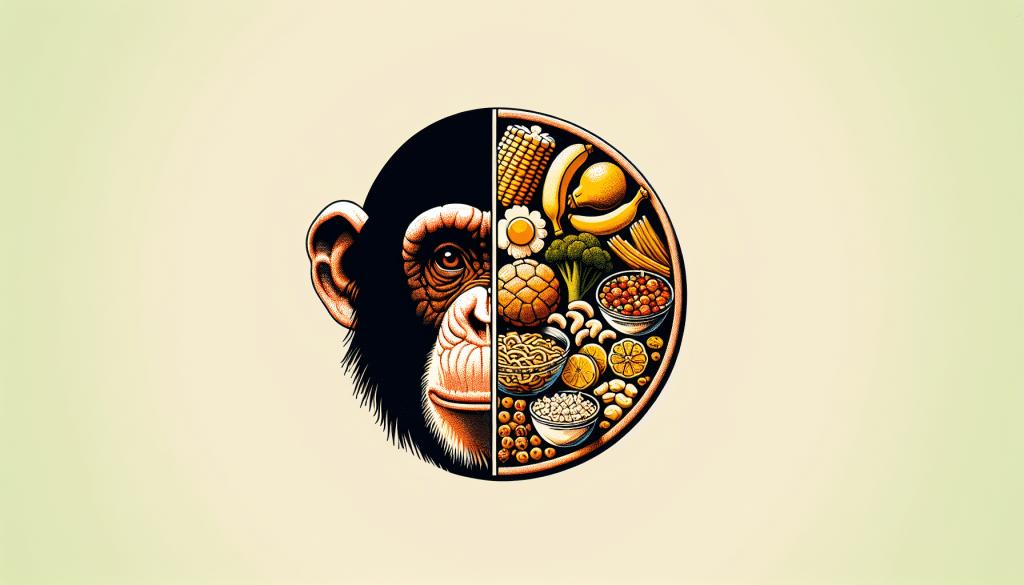Hey, have you ever wondered about the impact of diet on chimpanzee health? Well, it turns out that what these incredible creatures eat can have a significant effect on their overall well-being. From their habitat in the lush rainforests of Africa to sanctuaries around the world, researchers are carefully studying the diets of chimpanzees in order to better understand the relationship between nutrition and their health. By examining their eating habits, scientists hope to uncover valuable insights that could potentially guide conservation efforts and improve the overall welfare of these fascinating animals. So, let’s take a closer look at the impact of diet on chimpanzee health and discover how it influences their lives in ways we might not have imagined.

Understanding Chimpanzee Nutritional Needs
Chimpanzees, like humans, have specific nutritional needs that are vital for their overall health and well-being. By understanding these needs, we can ensure that chimpanzees, both in the wild and in captivity, receive a diet that promotes their optimal health.
Essential Nutrients for Chimpanzee Health
In order to thrive, chimpanzees require a variety of essential nutrients. These nutrients include carbohydrates, proteins, fats, vitamins, minerals, and fiber. Each of these nutrients plays a crucial role in the proper functioning of the chimpanzee’s body, from supporting muscle and cell maintenance to aiding in digestion and disease prevention.
Comparative Diet: Wild vs. Captive Chimpanzees
The diet of wild chimpanzees differs significantly from that of captive chimpanzees. Wild chimpanzees primarily consume a diverse range of plant materials, including fruits, leaves, nuts, and insects. On the other hand, captive chimpanzees often have a more controlled diet that consists of commercial primate chow, fruits, and vegetables provided by caretakers.
Caloric Intake and Energy Expenditure
Chimpanzees have high energy requirements due to their active lifestyles. In the wild, they spend a significant amount of time searching for food and engaging in various physical activities. It is crucial to provide chimpanzees with an adequate caloric intake to meet their energy needs. Failure to do so can lead to malnutrition, decreased immune function, and a higher risk of diseases.
Natural Diet of Chimpanzees in the Wild
The natural diet of wild chimpanzees varies depending on the season and the availability of different food sources. They primarily rely on fruits during the peak fruiting season, supplementing their diet with leaves, seeds, nuts, and insects during the rest of the year. This diverse diet ensures that they receive a wide range of nutrients necessary for their overall health and survival.
Seasonal Variations in Food Availability
The availability of food in the wild changes with each season, presenting unique challenges for wild chimpanzees. During periods of low fruit availability, chimpanzees must rely on alternative food sources to sustain themselves. This highlights their ability to adapt and utilize a variety of food items to meet their nutritional needs.
Foraging Behavior and Food Choices
Chimpanzees are skilled foragers and have been observed using tools to access hard-to-reach food sources, such as termite mounds or nuts. They exhibit complex food selection behaviors, choosing certain foods based on their ripeness, nutritional content, and taste preferences. These foraging behaviors showcase their intelligence and resourcefulness in obtaining a balanced diet.
Role of Fruits, Leaves, and Insects in Diet
Fruits play a crucial role in the diet of wild chimpanzees, providing them with essential vitamins, fibers, and sugars. Leaves serve as a significant source of protein and micronutrients, while insects offer a valuable source of animal protein. The combination of these food items ensures that chimpanzees meet their nutritional requirements and maintain overall health.
Effects of Poor Diet on Chimpanzee Health
A poor diet can have detrimental effects on the health of chimpanzees. Malnutrition, characterized by deficiencies in essential nutrients, can lead to stunted growth, weakened immune systems, and decreased fertility. Chimpanzees with inadequate diets are also more susceptible to diseases, as their weakened immune systems are unable to effectively fight off infections and illnesses.
Increased Susceptibility to Diseases
Chimpanzees with compromised immune systems due to a poor diet are more prone to infections and diseases, including respiratory, gastrointestinal, and parasitic infections. Nutritional deficiencies can reduce the effectiveness of their immune response, making them more vulnerable to these health risks.
Impact on Reproductive Health and Longevity
A balanced and nutritious diet is crucial for the reproductive health and longevity of chimpanzees. Malnutrition can affect the reproductive cycles of female chimpanzees and lead to reduced fertility rates. Inadequate nutrition during early development can also impact the overall health and lifespan of chimpanzees, potentially shortening their lifespan.

The Role of Fiber in Chimpanzee Diet
Fiber plays a vital role in the digestive health of chimpanzees. It aids in maintaining regular bowel movements, preventing constipation, and supporting a healthy gut microbiome. Wild chimpanzees obtain a significant amount of fiber from the leaves they consume, which helps regulate their digestive processes.
Fiber Sources in the Wild
In the wild, chimpanzees consume fibrous leaves, stems, and bark from various plant species. These fibers provide bulk to their diet, aiding in the digestion and absorption of nutrients. Additionally, they promote the growth of beneficial gut bacteria, which further contributes to the chimpanzees’ overall well-being.
Differences in Fiber Content: Wild vs. Captive Diets
Captive chimpanzees often have lower fiber intake compared to their wild counterparts. This is primarily due to the absence of naturally fibrous foods, such as leaves, in their captivity diet. Caretakers must ensure that captive chimpanzees receive an adequate amount of dietary fiber to promote optimal digestive health and prevent gastrointestinal issues.
Protein Requirements and Sources
Protein is essential for muscle and cell maintenance in chimpanzees. They obtain protein from both animal and plant-based sources. Wild chimpanzees often consume insects and occasionally hunt small mammals, such as monkeys, to fulfill their protein requirements. Plant-based sources of protein, such as nuts and seeds, also contribute to their overall protein intake.
Importance of Protein in Muscle and Cell Maintenance
Protein is crucial for the maintenance and repair of muscles and cells in chimpanzees. It provides the necessary building blocks for growth, development, and recovery. Adequate protein intake is especially important for young and growing chimpanzees to support their rapid growth and ensure healthy muscle development.
Hunting and Meat Consumption
While chimpanzees primarily have a plant-based diet, they have been observed hunting and consuming meat on occasion. This behavior is more commonly observed in certain chimpanzee populations, where they hunt small mammals for protein supplementation. Hunting and meat consumption can provide an additional source of nutrients necessary for their overall health.
Plant-Based Sources of Protein
In addition to animal-based sources, chimpanzees obtain protein from various plant-based sources. Nuts, seeds, legumes, and certain plant parts, such as the piths of certain stems, offer a good amount of protein. Wild chimpanzees exhibit a diverse diet that includes a variety of plant-based protein sources, ensuring they meet their protein requirements.
Influence of Fruits and Sugars
Chimpanzees have a natural preference for sweet fruits. These fruits not only provide carbohydrates for energy but also contain essential vitamins and minerals necessary for their overall health. However, it is important to consider the effects of excessive sugar intake, specifically fructose, on their health.
Preference for Sweet Fruits
Chimpanzees have taste receptors that make them particularly fond of sweet flavors. This preference for sweet fruits is thought to be a result of their evolution and the need to seek out high-calorie foods. By consuming sweet fruits, chimpanzees can meet their energy requirements while enjoying the taste preferences ingrained in their genetic makeup.
Effects of Fructose on Health
While sweet fruits contribute to the chimpanzees’ overall diet, it is important to be mindful of the potential adverse effects of excessive fructose intake. High levels of fructose have been linked to metabolic disorders, including increased risk of obesity, diabetes, and fatty liver disease. Caretakers must ensure that chimpanzees’ overall sugar intake, including fructose, remains within a balanced range.
Dental Health Concerns Related to Sugar Intake
Excessive sugar intake, including fructose, can also lead to dental health problems. Just like in humans, chimpanzees can develop dental decay and cavities due to the consumption of sugary foods. It is crucial to provide chimpanzees with a balanced diet that includes a variety of food items to minimize the negative impacts on their dental health.

Water Intake and Hydration
Hydration plays a vital role in the physiological processes of chimpanzees. Water is necessary for proper digestion, absorption of nutrients, regulation of body temperature, and overall cellular function. Wild chimpanzees obtain water from various sources, and ensuring an adequate water supply is essential for their well-being.
Water Sources for Wild Chimpanzees
In the wild, chimpanzees obtain water from natural sources, such as rivers, streams, rainwater, and even tree cavities. They have been observed using tools like leaves or sponges to collect and drink water, showcasing their resourcefulness in meeting their hydration needs. Access to clean water is crucial to prevent dehydration and related health issues.
Significance of Water in Physiological Processes
Water is involved in numerous physiological processes within chimpanzees’ bodies. It helps transport nutrients, maintain blood volume, regulate body temperature, lubricate joints, and flush out waste products. Without adequate hydration, chimpanzees may experience dehydration, which can have severe consequences on their health and well-being.
Hydration Status and Health Implications
Proper hydration is vital for the overall health of chimpanzees. Inadequate water intake can lead to dehydration, which can cause fatigue, organ dysfunction, electrolyte imbalances, and even heatstroke. Caretakers must ensure that captive chimpanzees have constant access to clean water, and wild populations should have access to natural water sources to maintain proper hydration.
Vitamin and Mineral Essentials
Chimpanzees require various vitamins and minerals to support their overall health and well-being. These micronutrients play important roles in immune function, cellular metabolism, bone health, and many other physiological processes. Understanding the key vitamins and minerals and their sources is crucial in ensuring that chimpanzees receive a nutritionally balanced diet.
Key Vitamins and Their Sources
Chimpanzees require vitamins such as vitamin A, vitamin C, vitamin E, and B vitamins for their optimal health. Wild chimpanzees obtain these vitamins from a diverse range of food sources, including fruits, leafy greens, and insects. Caretakers must ensure that chimpanzees, both in the wild and in captivity, receive a diet that provides sufficient amounts of these essential vitamins.
Mineral Intake and Bone Health
Minerals, including calcium, phosphorus, and magnesium, are crucial for the maintenance of strong bones and teeth in chimpanzees. In the wild, chimpanzees obtain these minerals from various food sources, including plant materials and insects. Proper mineral intake is essential for the prevention of bone disorders and ensures the overall skeletal health of chimpanzees.
Deficiencies and Related Health Issues
Deficiencies in vitamins and minerals can have serious health implications for chimpanzees. For example, vitamin C deficiency can lead to scurvy, while a lack of calcium can result in weak bones and teeth. Caretakers must monitor the vitamin and mineral levels in the chimpanzees’ diet to prevent deficiencies and the associated health problems.
Impact of Human Encroachment and Diet Changes
Human encroachment on chimpanzee habitats can have significant impacts on their diet and nutritional well-being. Deforestation and habitat loss limit the availability of natural food sources for chimpanzees, forcing them to adapt to new environments and dietary patterns. These changes can have negative consequences on their overall health and survival.
Effects of Habitat Loss on Diet
Habitat loss and deforestation reduce the diversity and availability of food sources for chimpanzees. This can disrupt their natural feeding patterns and force them to rely on less nutritious food items or scavenge for human waste. These changes in diet can result in malnutrition, increased disease susceptibility, and reproductive challenges for chimpanzee populations.
Human Food and Health Risks for Chimpanzees
Chimpanzees living in proximity to human settlements often have access to human food, which can present health risks. Human food may lack the necessary nutrients for chimpanzees, leading to nutritional deficiencies. Additionally, reliance on human food increases the chances of disease transmission, as certain human foods can be harmful or toxic to chimpanzees.
Conservation Efforts and Dietary Management
Conservation efforts play a crucial role in managing the diet and nutritional needs of chimpanzees. Protecting their natural habitats, promoting reforestation, and raising awareness about the importance of a balanced diet and nutritional well-being are essential steps in ensuring the long-term survival and health of chimpanzee populations.
Ethical Considerations in Feeding Captive Chimpanzees
Feeding captive chimpanzees comes with ethical considerations that must be taken into account. Providing a diet that meets their nutritional needs while mimicking their natural feeding behaviors and preferences is essential for their overall welfare and quality of life.
Ensuring Animal Welfare Through Diet
Caretakers of captive chimpanzees have a responsibility to provide a diet that promotes their overall well-being. This includes providing a variety of food items, incorporating foraging opportunities, and ensuring that the diet meets their nutritional requirements. By prioritizing animal welfare in dietary choices, caretakers can ensure that captive chimpanzees enjoy a healthy and fulfilling life.
Avoiding Anthropomorphism in Dietary Choices
While it is important to consider the preferences and natural behaviors of chimpanzees when designing their diet, it is equally crucial to avoid anthropomorphizing their dietary choices. Caretakers must strike a balance between providing a diet that mimics their natural feeding patterns and ensuring that the diet meets the specific nutritional needs of chimpanzees.
Legal and Moral Responsibilities of Caretakers
Caretakers of captive chimpanzees have legal and moral obligations to provide a diet that meets their nutritional requirements and promotes their overall health. This includes following relevant animal welfare regulations, regularly assessing dietary needs, and staying informed about the latest research and best practices in chimpanzee nutrition. By fulfilling these responsibilities, caretakers can contribute to the well-being of captive chimpanzees and the conservation of their species as a whole.
In conclusion, understanding the nutritional needs of chimpanzees is crucial for their well-being, whether they are living in the wild or in captivity. A balanced diet that incorporates a variety of food items, including fruits, leaves, insects, and protein sources, is essential for their overall health. Caretakers must ensure that chimpanzees receive adequate nutrition, hydration, and access to natural food sources, while also considering the ethical implications and responsibilities associated with feeding captive chimpanzees. By prioritizing their nutritional needs, we can contribute to the long-term health and conservation of these remarkable creatures.



